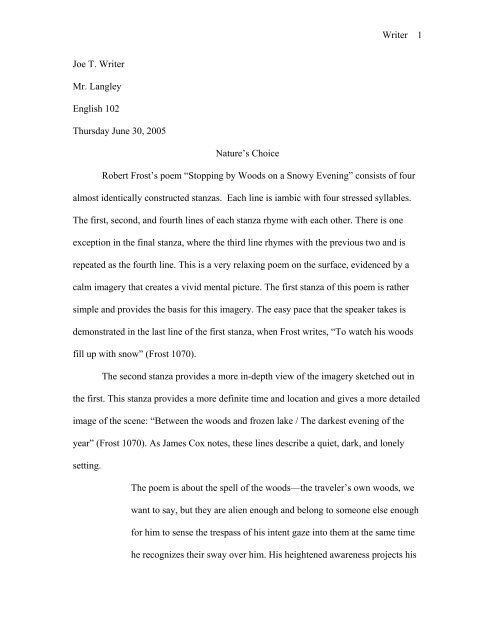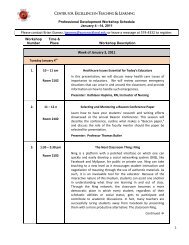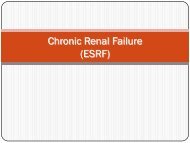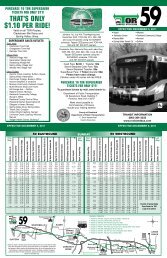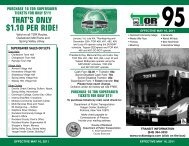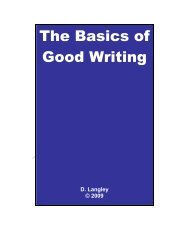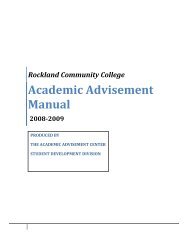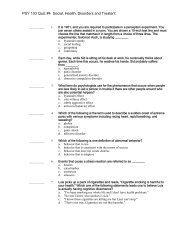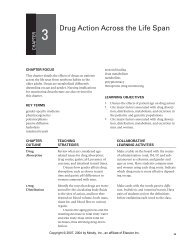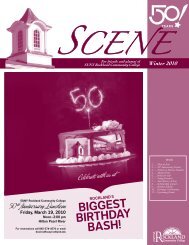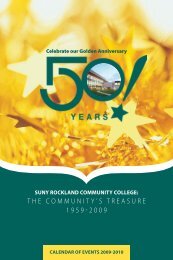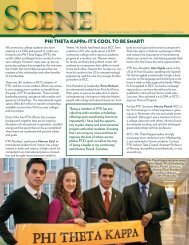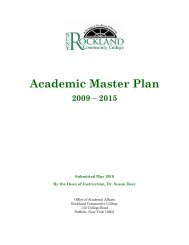Create successful ePaper yourself
Turn your PDF publications into a flip-book with our unique Google optimized e-Paper software.
Writer 1<br />
Joe T. Writer<br />
Mr. Langley<br />
<strong>English</strong> <strong>102</strong><br />
Thursday June 30, 2005<br />
Nature’s Choice<br />
Robert Frost’s poem “Stopping by Woods on a Snowy Evening” consists of four<br />
almost identically constructed stanzas. Each line is iambic with four stressed syllables.<br />
The first, second, and fourth lines of each stanza rhyme with each other. There is one<br />
exception in the final stanza, where the third line rhymes with the previous two and is<br />
repeated as the fourth line. This is a very relaxing poem on the surface, evidenced by a<br />
calm imagery that creates a vivid mental picture. The first stanza of this poem is rather<br />
simple and provides the basis for this imagery. The easy pace that the speaker takes is<br />
demonstrated in the last line of the first stanza, when Frost writes, “To watch his woods<br />
fill up with snow” (Frost 1070).<br />
The second stanza provides a more in-depth view of the imagery sketched out in<br />
the first. This stanza provides a more definite time and location and gives a more detailed<br />
image of the scene: “Between the woods and frozen lake / The darkest evening of the<br />
year” (Frost 1070). As James Cox notes, these lines describe a quiet, dark, and lonely<br />
setting.<br />
The poem is about the spell of the woods—the traveler’s own woods, we<br />
want to say, but they are alien enough and belong to someone else enough<br />
for him to sense the trespass of his intent gaze into them at the same time<br />
he recognizes their sway over him. His heightened awareness projects his
Writer 2<br />
concern for himself back to the representatives of civilization, the unseen<br />
owner of the woods and the horse in harness. Thus, the indifferent animal<br />
becomes, in his master’s alerted imagination, the guardian who sounds the<br />
alarm which rings above the whispered invitation. (151)<br />
The poem deals with much conflict for the speaker. As another critic says, “’Stopping by<br />
Woods on a Snowy Evening’ rejects nature’s impersonal appeal in favor of purpose, but<br />
the carefully vague last stanza refuses to indicate whether such purpose is self-generated<br />
or determined” (Nitchie 44). Cox adds, “The haunting rhythms of ‘Stopping by Woods<br />
on a Snowy Evening’ express the powerful fascination the woods have on the traveler,<br />
who—in the face of a long journey, descending night, and falling snow—pauses in the<br />
gathering gloom of the darkest evening of the year, transfixed by the compelling<br />
invitation of the forest” (150). Should he stay in the woods, where he is enjoying the<br />
peaceful serenity away from the troubles of his everyday life? Or should he leave the<br />
woods, go back into town, and face his obligations and continue to live his life? The<br />
speaker answers these questions in the last two lines: “And miles to go before I sleep /<br />
And miles to go before I sleep” (Frost 1070).<br />
Robert Frost’s poem “The Road Not Taken” consists of four stanzas with five<br />
lines in each stanza. There are four stressed syllables per line, and the rhyme scheme is<br />
five lines, with the exception of the last line “And that has made all the difference” (Frost<br />
143). Similar to “Stopping by Woods on a Snowy Evening,” this poem uses imagery to<br />
delineate the setting of this poem: “Two roads diverged in a yellow wood” (Frost 142)<br />
creates a vivid picture of the concrete present. This poem exemplifies the speaker’s belief<br />
that which path individuals choose in life makes them the people that they are. Nitchie
Writer 3<br />
writes, “The problem of choice is in a way even more elementary, since neither selfinterest,<br />
moral obligation, nor even curiosity provides a real basis for preferring one road<br />
to the other” (17). By choosing a certain path, “[b]ecause it was grassy and wanted wear”<br />
(Frost 143), the speaker must assume a sense of risk, especially when it is a path that has<br />
not been traveled often. This risk is made more apparent by the fact that previous people,<br />
faced with the choice of which road to take, chose the other one.<br />
We gain insight into the traveler’s personality that he is one who does not follow<br />
the crowd but assumes his own identity by taking the path to the unknown, although he<br />
does contemplate whether or not the right decision has been made. The speaker wants to<br />
travel down both paths, but he realizes that he has made a decision and cannot look back<br />
once he has made it. In this regard, Nitchie says, “For all that the act of choice is<br />
presented as whimsical and unmotivated, the speaker is aware that his choice will have<br />
consequences, though he cannot tell what those consequences will be” (160). The speaker<br />
must trust his judgment to be the correct choice for leading his course of life. In the end<br />
he is satisfied with his choice: “I took the one less traveled by, / And that has made all the<br />
difference” (Frost 143). To the speaker, what really made the difference is that he was in<br />
control of his decision and he chose to take the less traveled road; therefore, he is the man<br />
he is today because of that decision.<br />
These two poems are similar in a variety of ways. Both poems consist of four<br />
stanzas and an abundance of rhyme and imagery. These two poems are very well known<br />
for their simplicity. However, they both can be interpreted in many ways and easily<br />
misunderstood. In the poem “Stopping by Woods on a Snowy Evening,” the speaker<br />
takes in a lovely scene, is tempted to stay longer, but acknowledges a burden of
Writer 4<br />
obligations. This burden appears in the line, “But I have promises to keep” (Frost 1070).<br />
As one critic says, “In ‘Stopping by Woods on a Snowy Evening’ there is the<br />
attractiveness, the seductive and dark beauty of the woods filling up with snow. But there<br />
are also the promises to be kept. The speaker shows his humanity by his full awareness of<br />
this beauty, but he defines it finally by returning to the world of action and obligation”<br />
(Ryan 133). However, in the poem “The Road Not Taken,” the speaker must choose<br />
which path to take, even though it appears he will be faced with second-guessing himself<br />
somewhere down the line. This dilemma is apparent in the lines “I shall be telling this<br />
with a sigh / Somewhere ages and ages hence:”(Frost 143). One critic describes this sigh<br />
as follows: “The ‘sigh,’ of course helps characterize the ‘I,’ and provides the fist hint that<br />
the poem is a gentle parody of the kind of person whose life in the present is distorted by<br />
nostalgic regrets for the possibilities of the past, who is less concerned for the road taken<br />
than for ‘the road not taken’” (Barry 12).<br />
In both of these poems, the speakers face life-altering decisions. In “Stopping by<br />
Woods on a Snowy Evening,” the speaker must choose between succumbing to<br />
loneliness and depression or realizing there is much to be gained by living a happier life.<br />
In “The Road Not Taken,” the speaker must choose between two paths, not knowing<br />
what the future holds and if he will ever have the chance to find out what was passed up.<br />
In short, these two poems indicate a human being’s struggle with uncertainty and the<br />
inner turmoil that surrounds many of life’s decisions.
Writer 5<br />
Works Cited<br />
Barry, Elaine. Robert Frost. New York: Frederick Unger Publishing Co., 1973. 12.<br />
Cox, James M. “Robert Frost and the Edge of the Clearing.” The Virginia Quarterly<br />
Review. January, 1959: 144-154.<br />
Frost, Robert. “Stopping by Woods on a Snowy Evening.” Henry Holt & Co., 1916.<br />
Rpt. in Literature: The Human Experience. 8 th ed. Eds. Richard Abcarian and<br />
Marvin Klotz. Boston: Bedford Books, 2004. 1070.<br />
Frost, Robert. “The Road Not Taken.” Henry Holt & Co., 1916. Rpt. in Literature:<br />
The Human Experience. 8 th ed. Eds. Richard Abcarian and Marvin Klotz.<br />
Boston: Bedford Books, 2004. 142-143.<br />
Nitchie, George W. Human Values in the <strong>Poetry</strong> of Robert Frost. Durham: Duke<br />
University Press, 1960. 17, 44, 160.<br />
Ryan, Alvan S. “Frost and Emerson: Voice and Vision.” The Massachusetts Review<br />
January, 1959: 124-137.


